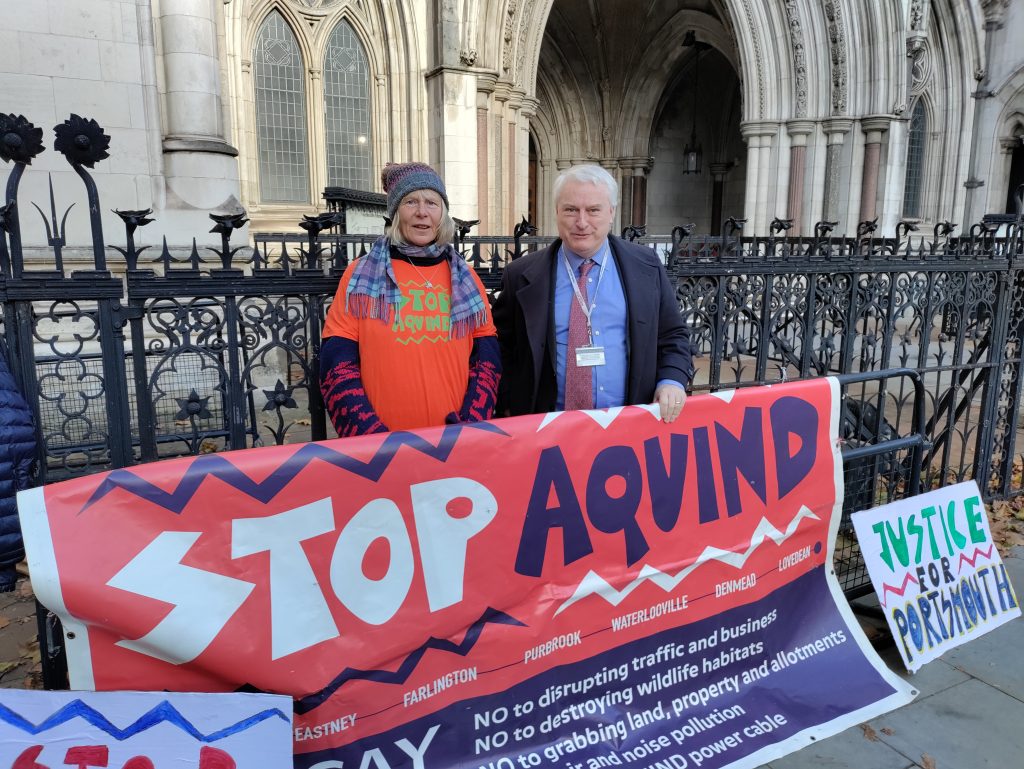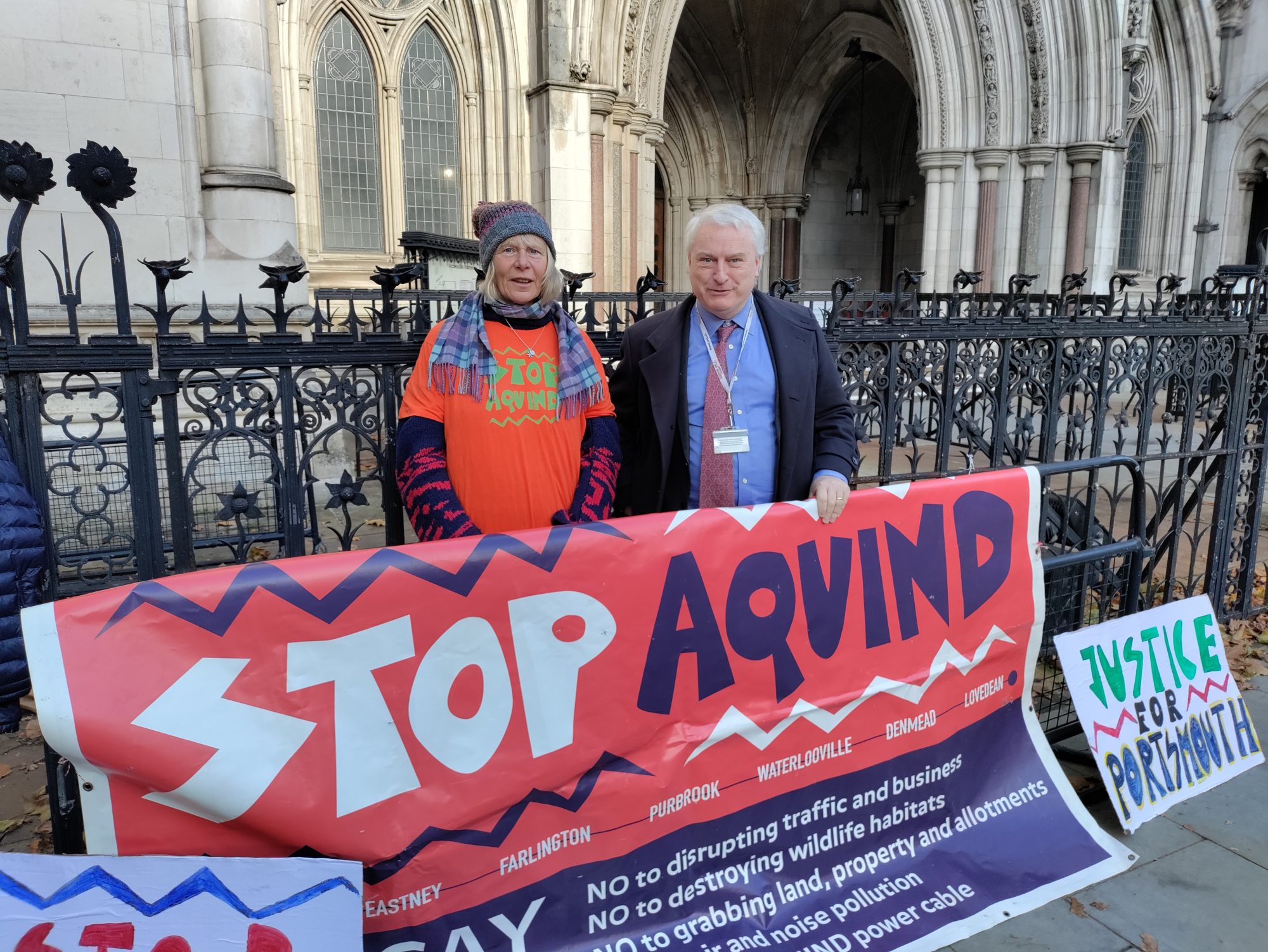Download this press statement as a PDF
On 20 January 2022, the then Secretary of State for the Department for Business, Energy & Industrial Strategy (BEIS), Kwasi Kwarteng, refused to grant Aquind Limited the Development Consent Order (DCO) it sought for the Aquind Interconnector – a decision that was widely celebrated in Portsmouth.
The residents of the city felt that this represented a successful conclusion to the grassroots campaign against Aquind, which was supported by both Portsmouth MP’s, the leader of the city council and unanimously by city councillors of every political stripe.
However, Aquind Limited was granted permission to apply for judicial review of the decision. The judicial review will be heard at the High Court on 22 & 23 November and consequently the issue has once again become a hot topic in the city.
The community campaign against the proposal, Let’s Stop Aquind, examines here what has, and has not, changed since the project was originally proposed in 2016.
What has changed
The economic case
The Aquind Interconnector was initially planned to take advantage of the difference in price of relatively cheap nuclear power generated in Northern France and the prevailing electricity price in the UK. A 242 kilometre High Voltage electric cable would be laid from Normandy to the South Downs, where it would join the national grid at Lovedean, North of Portsmouth, adjacent to the South Downs National Park.
The plans also allowed for a high-capacity fibre-optic communications network to be installed alongside the cable, an aspect of the project that came under increasing scrutiny as it appeared to be a separate commercial enterprise.
Since then, the economic case for the Aquind Interconnector has collapsed. Even before the pan-European energy crisis caused by the Russian invasion of Ukraine, the nuclear power on which France relies for 70% of its total needs had become significantly scarcer as a result of a costly and time-consuming maintenance of the aging EDF nuclear estate.
Many reactors have been taken offline, with availability currently standing at only 51% of total capacity. In its own words, “Aquind is projected to flow predominantly from the lower priced French market to GB” so it relies on an abundance of cheap French nuclear electricity.
While the interconnector was planned to be bi-directional, carrying UK power to France when there is a surplus, the balance between importing and exporting power through interconnectors stands at 90% to 10%. In fact, despite the huge growth in interconnector capacity between the UK and Europe, the amount of power exported has stayed static over the last 10 years.
We believe that, given the energy security issues caused by war in Ukraine and the political effects of Brexit, selling its valuable domestic power to the UK for the private profit of the owners of Aquind is simply not a priority for France.
UK energy policy
Likewise, UK domestic energy policy has changed since 2016. There is now a focus on energy security and low-cost renewable sources such as offshore wind produced and consumed locally. The government is now committed to a “major acceleration of homegrown power in Britain’s plan for greater energy independence”. The Truss administration even introduced planning reforms to remove the long-term block on onshore wind projects, although this was reversed by Prime Minister Sunak, despite widespread public support, even amongst Tory voters.
Post Brexit, relying on energy imported from a foreign power through strategic infrastructure owned by an obscure Luxembourg holding company on behalf of foreign (born) investors who may not have the UK’s best interests at heart, meets none of the government’s objectives. Nor will it offer UK consumers cheaper energy, as the imported electricity, for which Aquind has negotiated an exemption from the existing pricing regime, will be competing with cheap homegrown renewables.
The political climate
The political climate has also changed dramatically in recent times. Aquind Limited has the benefit of the political connections of co-owner Alexander Temerko. Mr Temerko is the former head of Russkoe Oruzhie (Russian Weapons), a “corporation that produced armaments for Russian military forces“, a significant role in the Russian state arms industry, but he had been welcomed with open arms by the Conservative Party, in which he is a rising star and member of the Leader’s Group of
donors. He was also known to be on first name terms with former prime minister Boris Johnson and ex-chancellor Kwasi Kwarteng, but neither retain cabinet positions.
The government recognised the strategic importance of the ownership of energy assets in the National Security and Investment Act 2021, which protected against businesses perceived to be potential threats to the national interest.
As a result of the threat posed by Russian oligarchs assumed to be controlled by, or working for the interests of, a foreign power14, the UK government has enforced substantial sanctions and passed the Economic Crime (Transparency and Enforcement) 2022 Act to give greater transparency to the beneficial ownership of UK properties by foreign entities.
What has not changed
The environmental case
The environmental case against the Aquind Interconnector remains overwhelming. The damage to onshore and shoreline wildlife, loss of bird and insect habitats, threat to protected species and loss of public sports and leisure amenities are simply unacceptable to the residents of Portsmouth.
Campaigners have scorned the plan to run the cable through the precious green spaces of the UK’s most densely populated city outside of London, and demanded alternative routes be examined in sufficient detail.
Likewise, the leader of East Hampshire District Council Cllr Richard Millard, spoke out on the environmental damage threatened by the project:
“I stand by our opposition to the project. We deem the impact on our environment – from our coastline up to our national park – as unacceptable.”
Together we will #stopAQUIND.
Lets Stop Aquind 22/11/2022


